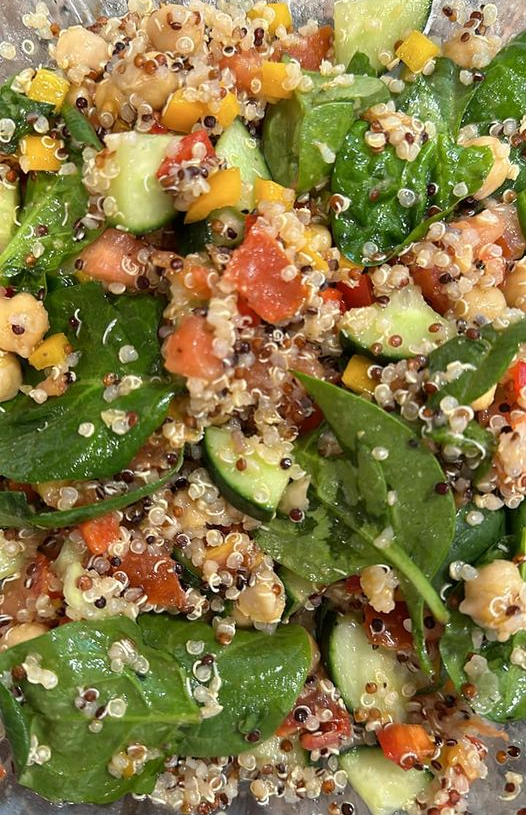Ingredients
Cucumber, ![]()
tomato ![]()
chickpeas,
garlic ![]() ,
,
bell pepper ![]() ,
,
spinach ![]() ,
,
quinoa,
avocado oil ![]() ,
,
lemon ![]() juice,
juice,
salt and pepper!
I didn’t measure anything I just cut some up and threw it together for my meal prep tomorrow! The only thing I wish I had to add to it were pumpkin seeds, vegan feta, and a red onion, but this will do!
Vegan salad

Salads have long been a staple of healthy eating, celebrated for their versatility, nutritional value, and refreshing flavors. In recent years, vegan salads have taken center stage, capturing the attention of those who seek to enjoy meals that are both delicious and aligned with ethical and environmental values. A well-crafted vegan salad is a culinary masterpiece, bursting with vibrant colors, diverse textures, and an array of flavors that can satisfy even the most discerning palate. Whether you’re a dedicated vegan or simply looking to incorporate more plant-based meals into your diet, vegan salads offer a wholesome, nourishing option that showcases the best of what plant-based cuisine has to offer.
The essence of a great vegan salad lies in its ingredients, which range from fresh vegetables and leafy greens to fruits, nuts, seeds, and legumes. These components not only provide a rich tapestry of flavors but also contribute significantly to a balanced diet. Leafy greens such as spinach, kale, and arugula are packed with vitamins, minerals, and antioxidants that support overall health. Adding a variety of vegetables like bell peppers, tomatoes, and cucumbers introduces different textures and nutrients, while fruits such as berries, apples, and citrus add a touch of sweetness and a burst of vitamin C. Nuts and seeds, like almonds, walnuts, and chia seeds, provide healthy fats and protein, making the salad more satisfying and nutritious.
One of the most compelling reasons to embrace vegan salads is their health benefits. Plant-based diets have been associated with a reduced risk of chronic diseases such as heart disease, diabetes, and certain cancers. Vegan salads, rich in fiber, vitamins, and phytonutrients, contribute to better digestion, improved heart health, and a stronger immune system. The high fiber content helps regulate blood sugar levels and promotes a feeling of fullness, which can aid in weight management. Furthermore, the antioxidants found in many salad ingredients help combat oxidative stress and inflammation, contributing to long-term health and well-being.
Environmental sustainability is another significant advantage of choosing vegan salads. The production of plant-based foods generally requires fewer resources and generates lower greenhouse gas emissions compared to animal agriculture. By opting for plant-based meals, individuals can significantly reduce their environmental footprint. Ingredients for vegan salads can often be sourced locally and seasonally, supporting local farmers and reducing the carbon footprint associated with transportation. This aligns with the growing movement towards sustainable eating practices, where consumers are increasingly aware of the environmental impact of their food choices and seek to make more eco-friendly decisions.
Culinary creativity and diversity are hallmarks of vegan salads. They serve as a blank canvas that can be adapted to different tastes, seasons, and dietary needs. The endless variety of ingredients and combinations allows for continual experimentation and personalization. From Asian-inspired salads with tofu, edamame, and ginger sesame dressing to Mediterranean versions featuring chickpeas, olives, and tahini, the possibilities are limitless. Adding grains like quinoa, farro, or brown rice can make the salad more substantial, while fresh herbs and homemade dressings elevate the flavors to new heights. This flexibility ensures that vegan salads remain a dynamic and exciting part of any diet.
Culturally, salads have evolved from simple side dishes to become main courses in their own right, particularly in the context of vegan cuisine. They are often associated with health-conscious and progressive lifestyles, reflecting a commitment to personal well-being and environmental stewardship. Vegan salads can be enjoyed as quick and easy meals, elegant dishes for entertaining, or nourishing options for outdoor picnics and gatherings. Their ability to bring people together around a shared appreciation for fresh, wholesome food highlights their social and cultural significance in contemporary dining.
In conclusion, vegan salads epitomize the intersection of health, sustainability, and culinary delight. They offer a versatile and delicious way to enjoy the benefits of a plant-based diet, whether you’re a seasoned vegan or exploring plant-based options for the first time. The rise in popularity of vegan salads reflects a broader shift towards more conscious and ethical eating habits, proving that it is possible to enjoy diverse, flavorful, and satisfying meals while supporting a healthier, more sustainable, and compassionate lifestyle. Whether you are preparing a quick lunch, a festive dinner, or a nourishing snack, vegan salads provide a delightful and nutritious option that celebrates the bounty of plant-based ingredients.
